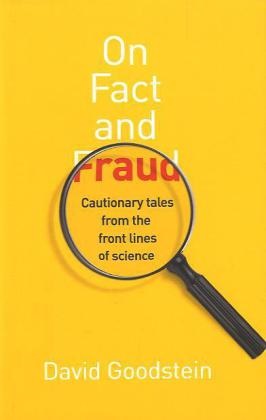Read more
Zusatztext "This volume is essential for anyone interested in the history of science in Norway and in the history of Trondheim, but it also offers excellent material for comparison with other scientific societies in Europe and elsewhere during the last 250 years." ---Karl Grandin, ISIS Informationen zum Autor David Goodstein is the Frank J. Gilloon Distinguished Teaching and Service Professor in the Department of Physics at the California Institute of Technology. His books include Out of Gas: The End of the Age of Oil and Feynman's Lost Lecture . Klappentext Fraud in science is not as easy to identify as one might think. When accusations of scientific misconduct occur, truth can often be elusive, and the cause of a scientist's ethical misstep isn't always clear. On Fact and Fraud looks at actual cases in which fraud was committed or alleged, explaining what constitutes scientific misconduct and what doesn't, and providing readers with the ethical foundations needed to discern and avoid fraud wherever it may arise. Here, Goodstein takes us on a tour of real controversies from the front lines of science and helps readers determine for themselves whether or not fraud occurred. Cases include, among others, those of Robert A. Millikan, whose historic measurement of the electron's charge has been maligned by accusations of fraud; Martin Fleischmann and Stanley Pons and their "discovery" of cold fusion; Victor Ninov and the supposed discovery of element 118; Jan Hendrik Schön from Bell Labs and his work in semiconductors; and J. Georg Bednorz and Karl Müller's discovery of high-temperature superconductivity, a seemingly impossible accomplishment that turned out to be real. Zusammenfassung An in-depth look at scientific fraud Fraud in science is not as easy to identify as one might think. When accusations of scientific misconduct occur, truth can often be elusive, and the cause of a scientist's ethical misstep isn't always clear. On Fact and Fraud looks at actual cases in which fraud was committed or alleged, explaining what constitutes scientific misconduct and what doesn't, and providing readers with the ethical foundations needed to discern and avoid fraud wherever it may arise. In David Goodstein's varied experience—as a physicist and educator, and as vice provost at Caltech, a job in which he was responsible for investigating all allegations of scientific misconduct—a deceptively simple question has come up time and again: what constitutes fraud in science? Here, Goodstein takes us on a tour of real controversies from the front lines of science and helps readers determine for themselves whether or not fraud occurred. Cases include, among others, those of Robert A. Millikan, whose historic measurement of the electron's charge has been maligned by accusations of fraud; Martin Fleischmann and Stanley Pons and their "discovery" of cold fusion; Victor Ninov and the supposed discovery of element 118; Jan Hendrik Schön from Bell Labs and his work in semiconductors; and J. Georg Bednorz and Karl Müller's discovery of high-temperature superconductivity, a seemingly impossible accomplishment that turned out to be real. On Fact and Fraud provides a user's guide to identifying, avoiding, and preventing fraud in science, along the way offering valuable insights into how modern science is practiced. ...

